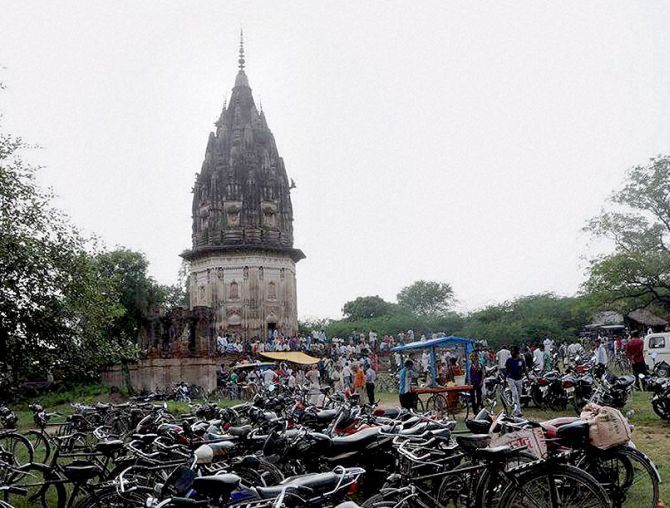 A sadhu's dream, and India's bizarre response reveals the country's true nature, says Amberish K Diwanji.
A sadhu's dream, and India's bizarre response reveals the country's true nature, says Amberish K Diwanji.
There is bizarre and there is bizarre!
The way government officials and ordinary people are digging for gold in Unnao, which lies between Kanpur and Lucknow in Uttar Pradesh -- a state that has given India most of its prime ministers, and where some of the holiest Hindu cities are to be found -- all because a particular sadhu had a dream, must surely rank as the most bizarre of them all.
There is nothing wrong in digging for gold.
The desire to get rich, overnight or over time, has driven most human enterprise over millennia. The California gold rush and the Alaska gold rush saw thousands of people move into wild frontier zones. The lure of India's vast treasures drew people and conquerors from lands afar.
Even today, if people know there is gold to be found, you can be sure that they will turn up in droves, all dreaming of garnering a slice of the yellow metal.
Every day, millions of people, in India and across the world, buy lottery tickets, dreaming of becoming rich overnight. Digging for gold in a particular spot is a bit like buying a lottery; you never know where lady luck smiles. Any person anywhere would be tempted to put spade into ground! But what makes the Unnao case so very weird is the way the whole drama unfolded!
It was -- and this is quite unbelievable! -- based on some sadhu's dream.
The sadhu is apparently popular in the region with quite a few followers. According to news reports, he had a dream in which he was told that about 1,000 tonnes of gold lay buried below the ruins of an old palace, whose ruler was hanged by the British for participating in the 1857 war.
In comparison, much gold rushes happened after early visitors actually discovered gold, and the news spread by word of mouth. People didn't go into frozen Alaska because someone had a dream!
This is not to berate the sadhu. By virtue of being a sadhu, he has declared himself to be a man of faith.
After doing a small puja, the said sadhu, Swami Shoban Sarkar, headed off to his ashram in Buxar. That his followers should believe him and dig for gold too is understandable; they are, after all, his followers and in digging, they are not breaking any law (if they are, it is the government's job to take the necessary action).
One can forgive the people going crazy, but what is truly unforgivable is the way the state administration and the government organisations have behaved.
The Archaeological Survey of India, charged with looking for India's numerous monuments, the Geological Survey of India, whose job it is to map the land, and even the local administration, all rushed to the spot and began digging after conducting a bhoomi pujan. They were aided by state officials, with the local magistrate taking the lead.
This is pathetic.
The ASI and GSI are welcome to dig for land, but surely an India that dreams of sending men into outer space, and whose probes to the moon discovered water (in the form of ice), has far more rational methods of deciding where to dig and where not to.
Is this what India has come, where our government departments dance a merry jig merely because some sadhu had a dream? It is unbelievable that in this day and age, organisations like the ASI and GSI have no better way of determining the likely place where gold may be found.
Ultimately, this frenzy only proves India remains at heart a backward country, driven by a sadhu's dreams and irrational beliefs.
Rationalism cannot be merely taught in the classrooms, it has to become a way of life.
India, it is evident, is far away from such thinking. Far too many of us, despite degrees in science and technology, despite education and learning, continue to put our faith in seers and pseudo-science like astrology.
When someone like Narendra Dabholkar attempt to change this status quo, they get assassinated (and the killers remain at large).
One of the Fundamental Duties mandated by the Constitution is 'to develop a scientific temperament'.
If only to abide by the Constitution, the government, both state and central, must act against the officials whose very presence at the site has aided the frenzy. It is only the first step of a long journey towards truly educating India.
Image: The frenzied quest for gold in Unnao.










